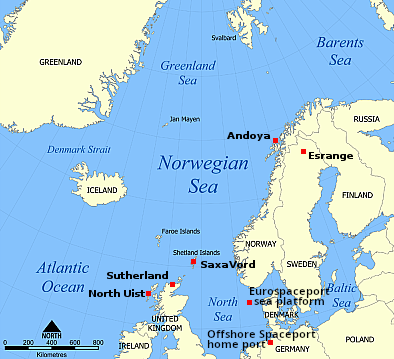Author: Robert Zimmerman
February 23, 2026 Quick space links
Courtesy of BtB’s stringer Jay. This post is also an open thread. I welcome my readers to post any comments or additional links relating to any space issues, even if unrelated to the links below.
- Video from Sierra Space of the Tenacity Dream Chaser tow tests
Posted last week, but I think it shows the tow tests done in November 2025. As I noted then, these tow tests should have been done years ago, not after final electromagnetic, telemetry, and vibration tests. There is something wrong here that Sierra Space is not telling us.
- On this day in 1966, the USSR launched an adapted Voskhod spacecraft carrying the dogs Veterok and Ugolyok
The mission lasted 21 days — the first such long term flight — and returned the dogs alive, though in poor health. They had lost weight, but more important was the discovery that weightlessness caused a loss of bone density.
- On this day in 1969, the Soviet Union attempted the first test flight of its giant N-1 rocket
The launch was a failure, as were the three that followed.
Courtesy of BtB’s stringer Jay. This post is also an open thread. I welcome my readers to post any comments or additional links relating to any space issues, even if unrelated to the links below.
- Video from Sierra Space of the Tenacity Dream Chaser tow tests
Posted last week, but I think it shows the tow tests done in November 2025. As I noted then, these tow tests should have been done years ago, not after final electromagnetic, telemetry, and vibration tests. There is something wrong here that Sierra Space is not telling us.
- On this day in 1966, the USSR launched an adapted Voskhod spacecraft carrying the dogs Veterok and Ugolyok
The mission lasted 21 days — the first such long term flight — and returned the dogs alive, though in poor health. They had lost weight, but more important was the discovery that weightlessness caused a loss of bone density.
- On this day in 1969, the Soviet Union attempted the first test flight of its giant N-1 rocket
The launch was a failure, as were the three that followed.
Saturn’s moon Enceladus, as seen during Cassini’s last close fly-by
Cool image time! On December 19, 2015 the Saturn orbiter Cassini made its last close fly-by of the moon Enceladus, known best for the many geysers detected on its surface venting water and other carbon-based materials.
The picture to the right, reduced and enhanced to post here, shows that the entire face of this
Saturn’s moon Enceladus, as seen during that fly-by. The moon itself is only about 310 miles across.
Its icy surface is evident, as are the many fractures, some meandering almost like rivers. Interestingly, for some reason there are a lot more craters in the lower hemisphere, while the upper hemisphere is more completely covered with fractures.
The black outline indicates the approximate area captured by the two close-up images below.
» Read more
Cool image time! On December 19, 2015 the Saturn orbiter Cassini made its last close fly-by of the moon Enceladus, known best for the many geysers detected on its surface venting water and other carbon-based materials.
The picture to the right, reduced and enhanced to post here, shows that the entire face of this
Saturn’s moon Enceladus, as seen during that fly-by. The moon itself is only about 310 miles across.
Its icy surface is evident, as are the many fractures, some meandering almost like rivers. Interestingly, for some reason there are a lot more craters in the lower hemisphere, while the upper hemisphere is more completely covered with fractures.
The black outline indicates the approximate area captured by the two close-up images below.
» Read more
Webb imaged a star before it went supernova
One of the biggest challenges facing astronomers for more than four centuries has been the detection of a star prior to its going supernova. Until very recently, no such detection had ever happened, and so astronomers could only guess at the kind of stars or binary systems that might result in these gigantic stellar explosions.
In recent years the improvement in telescopes, both in orbit and on the ground, has produced some successes, whereby the progenitor star was imaged in archival imagery and found after the explosion. The sample however has been small, and the data limited to only a few wavelengths.
Now, the Webb Space Telescope has made its first detection of a supernova progenitor, in the infrared. That image is to the right, showing the star prior to the June 2025 supernova explosion.
By carefully aligning Hubble and Webb images taken of NGC 1637, the team was able to identify the progenitor star in images taken by Webb’s MIRI (Mid-Infrared Instrument) and NIRCam (Near-Infrared Camera) in 2024. They found that the star appeared surprisingly red – an indication that it was surrounded by dust that blocked shorter, bluer wavelengths of light. “It’s the reddest, most dusty red supergiant that we’ve seen explode as a supernova,” said graduate student and co-author Aswin Suresh of Northwestern University.
This excess of dust could help explain a long-standing problem in astronomy that could be described as the case of the missing red supergiants. Astronomers expect the most massive stars that explode as supernovas to also be the brightest and most luminous. So, they should be easy to identify in pre-supernova images. However, that hasn’t been the case.
One potential explanation is that the most massive aging stars are also the dustiest. If they’re surrounded by large quantities of dust, their light could be dimmed to the point of undetectability. The Webb observations of supernova 2025pht support that hypothesis.
You can read the peer-reviewed paper here [pdf].
One of the biggest challenges facing astronomers for more than four centuries has been the detection of a star prior to its going supernova. Until very recently, no such detection had ever happened, and so astronomers could only guess at the kind of stars or binary systems that might result in these gigantic stellar explosions.
In recent years the improvement in telescopes, both in orbit and on the ground, has produced some successes, whereby the progenitor star was imaged in archival imagery and found after the explosion. The sample however has been small, and the data limited to only a few wavelengths.
Now, the Webb Space Telescope has made its first detection of a supernova progenitor, in the infrared. That image is to the right, showing the star prior to the June 2025 supernova explosion.
By carefully aligning Hubble and Webb images taken of NGC 1637, the team was able to identify the progenitor star in images taken by Webb’s MIRI (Mid-Infrared Instrument) and NIRCam (Near-Infrared Camera) in 2024. They found that the star appeared surprisingly red – an indication that it was surrounded by dust that blocked shorter, bluer wavelengths of light. “It’s the reddest, most dusty red supergiant that we’ve seen explode as a supernova,” said graduate student and co-author Aswin Suresh of Northwestern University.
This excess of dust could help explain a long-standing problem in astronomy that could be described as the case of the missing red supergiants. Astronomers expect the most massive stars that explode as supernovas to also be the brightest and most luminous. So, they should be easy to identify in pre-supernova images. However, that hasn’t been the case.
One potential explanation is that the most massive aging stars are also the dustiest. If they’re surrounded by large quantities of dust, their light could be dimmed to the point of undetectability. The Webb observations of supernova 2025pht support that hypothesis.
You can read the peer-reviewed paper here [pdf].
First visual detection of another star’s heliosphere
Using both the Hubble Space Telescope and the Chandra X-ray Observatory, astronomers have made the first visual detection of another star’s heliosphere, in both X-rays and in the infrared.
The image to the right, cropped to post here.
Astronomers have nicknamed the HD 61005 star system the “Moth” because it is surrounded by large amounts of dust patterned similarly to the shape of a moth’s wings when viewed through infrared telescopes. The wings are formed from material left behind after the formation of the star, similar to the Kuiper Belt in our own solar system. Observations of these wings with NASA’s Hubble Space Telescope showed that the interstellar matter surrounding HD 61005 is about a thousand times denser than that around the Sun.
The wings are the points to the left and right. The star’s young heliosphere, which they dub an “astrosphere,” is the purple glow above and below. From the caption:
In this composite image of HD 61005 in the inset, X-rays from Chandra (purple and white) have been combined with infrared data from Hubble (blue and white). Chandra reveals a bright source of X-rays in the center of the image, which is the star itself surrounded by the star’s astrosphere. The wing-like structure sweeping away from the star in the infrared image is dusty material that remained behind after the formation of the star. These wings have been swept backwards as they fly through space.
As this star and its solar system are very young, what we have is a very dusty accretion disk interacting with a very temperamental baby star.
Using both the Hubble Space Telescope and the Chandra X-ray Observatory, astronomers have made the first visual detection of another star’s heliosphere, in both X-rays and in the infrared.
The image to the right, cropped to post here.
Astronomers have nicknamed the HD 61005 star system the “Moth” because it is surrounded by large amounts of dust patterned similarly to the shape of a moth’s wings when viewed through infrared telescopes. The wings are formed from material left behind after the formation of the star, similar to the Kuiper Belt in our own solar system. Observations of these wings with NASA’s Hubble Space Telescope showed that the interstellar matter surrounding HD 61005 is about a thousand times denser than that around the Sun.
The wings are the points to the left and right. The star’s young heliosphere, which they dub an “astrosphere,” is the purple glow above and below. From the caption:
In this composite image of HD 61005 in the inset, X-rays from Chandra (purple and white) have been combined with infrared data from Hubble (blue and white). Chandra reveals a bright source of X-rays in the center of the image, which is the star itself surrounded by the star’s astrosphere. The wing-like structure sweeping away from the star in the infrared image is dusty material that remained behind after the formation of the star. These wings have been swept backwards as they fly through space.
As this star and its solar system are very young, what we have is a very dusty accretion disk interacting with a very temperamental baby star.
NASA to return SLS to assembly building tomorrow Wednesday
UPDATE: Due to weather, the roll back to the VAB is now delayed until Wednesday, February 25, 2026.
Original post:
————————
According to its most recent update, NASA is now planning on rolling its SLS rocket back to the Vehicle Assembly Building (VAB) no sooner than tomorrow, February 24, 2026, in order to begin its investigation into the helium flow issue in the rocket’s upper stage that has now delayed any launch until April at the earliest.
Returning to the Vehicle Assembly Building at Kennedy is required to determine the cause of the issue and fix it.
Teams are reviewing the exact time to begin the approximately 4 mile, multi-hour trek. The quick work to begin preparations for rolling the rocket and spacecraft back to the VAB potentially preserves the April launch window, pending the outcome of data findings, repair efforts, and how the schedule comes to fruition in the coming days and weeks.
The present launch window closes on April 6, 2026. For a launch to occur, NASA engineers need to identify and fix the flow issue. They will also need to test it, which suggests they will have to do some form of fueling test once the rocket is returned to the launchpad.
All of this takes time. First we have one week to get back to the VAB. Then at least a full two weeks in the VAB to identify and fix the upper stage. Then another week to roll the rocket back to the launch pad. And then another week to do another fueling test on the launchpad. That brings us to the beginning of April.
In other words, NASA has no time margin at all. If anything takes just a little longer than planned, it will not make the April launch window.
None of this is a surprise. SLS in its first launch attempt in 2022 missed its spring launch window due to similar issues and ended up launching six months later (after more launch scrubs). I predicted it would happen again now. NASA at this moment has not revealed any later launch windows, so we don’t yet know how long a delay to expect if it misses this window. Based on 2022, I suspect the delay would be until the fall.
UPDATE: Due to weather, the roll back to the VAB is now delayed until Wednesday, February 25, 2026.
Original post:
————————
According to its most recent update, NASA is now planning on rolling its SLS rocket back to the Vehicle Assembly Building (VAB) no sooner than tomorrow, February 24, 2026, in order to begin its investigation into the helium flow issue in the rocket’s upper stage that has now delayed any launch until April at the earliest.
Returning to the Vehicle Assembly Building at Kennedy is required to determine the cause of the issue and fix it.
Teams are reviewing the exact time to begin the approximately 4 mile, multi-hour trek. The quick work to begin preparations for rolling the rocket and spacecraft back to the VAB potentially preserves the April launch window, pending the outcome of data findings, repair efforts, and how the schedule comes to fruition in the coming days and weeks.
The present launch window closes on April 6, 2026. For a launch to occur, NASA engineers need to identify and fix the flow issue. They will also need to test it, which suggests they will have to do some form of fueling test once the rocket is returned to the launchpad.
All of this takes time. First we have one week to get back to the VAB. Then at least a full two weeks in the VAB to identify and fix the upper stage. Then another week to roll the rocket back to the launch pad. And then another week to do another fueling test on the launchpad. That brings us to the beginning of April.
In other words, NASA has no time margin at all. If anything takes just a little longer than planned, it will not make the April launch window.
None of this is a surprise. SLS in its first launch attempt in 2022 missed its spring launch window due to similar issues and ended up launching six months later (after more launch scrubs). I predicted it would happen again now. NASA at this moment has not revealed any later launch windows, so we don’t yet know how long a delay to expect if it misses this window. Based on 2022, I suspect the delay would be until the fall.
Exolaunch integrates five satellites in Isar’s Spectrum rocket

Proposed or active spaceports in North Europe
Exolaunch, which specializes in preparing and integrating satellites onto rockets for satellite companies, has now completed the integration of the five satellite payloads that will fly on the second launch attempt of the German startup Isar Aerospace.
The launch is presently scheduled for March 19, 2026, lifting off from Norway’s Andoya spaceport, and is Isar’s second attempt to complete an orbital launch. The first, in March 2025, failed mere seconds after launch due to a loss of attitude control.
The payloads are as follows:
- CyBEEsat for Technische Universität Berlin (Germany)
- TRISAT-S for University of Maribor (Slovenia)
- STS1 for Technische Universität Wien (Austria)
- Platform 6 6UXL for Endurosat (Bulgaria)
- FramSat1 for Norwegian University of Science and Technology (Norway).
These are all cubesats and are all likely student projects, willing to risk their launch on an untested rocket because the cost is low.
Of the half dozen or so rocket startups in Europe, Isar appears in the lead. Both PLD and Rocket Factory Augsburg say they will attempt a launch in 2026, but neither has set a date. And both will be trying for their first time, unlike Isar.
It also appears that Andoya is in the lead in the race to be the first European spaceport to complete an orbital launch. The spaceports in the United Kingdom started almost a decade earlier, but have been stymied by government red tape. Norway in turn moved fast to make its regulations simple and fast.

Proposed or active spaceports in North Europe
Exolaunch, which specializes in preparing and integrating satellites onto rockets for satellite companies, has now completed the integration of the five satellite payloads that will fly on the second launch attempt of the German startup Isar Aerospace.
The launch is presently scheduled for March 19, 2026, lifting off from Norway’s Andoya spaceport, and is Isar’s second attempt to complete an orbital launch. The first, in March 2025, failed mere seconds after launch due to a loss of attitude control.
The payloads are as follows:
- CyBEEsat for Technische Universität Berlin (Germany)
- TRISAT-S for University of Maribor (Slovenia)
- STS1 for Technische Universität Wien (Austria)
- Platform 6 6UXL for Endurosat (Bulgaria)
- FramSat1 for Norwegian University of Science and Technology (Norway).
These are all cubesats and are all likely student projects, willing to risk their launch on an untested rocket because the cost is low.
Of the half dozen or so rocket startups in Europe, Isar appears in the lead. Both PLD and Rocket Factory Augsburg say they will attempt a launch in 2026, but neither has set a date. And both will be trying for their first time, unlike Isar.
It also appears that Andoya is in the lead in the race to be the first European spaceport to complete an orbital launch. The spaceports in the United Kingdom started almost a decade earlier, but have been stymied by government red tape. Norway in turn moved fast to make its regulations simple and fast.
SpaceX launches 28 more Starlink satellites on 2nd launch today; sets new 1st stage reuse record
SpaceX this evening completed its second launch today, placing 28 more Starlink satellites in orbit, its Falcon 9 rocket lifting off from Cape Canaveral Space Force Station in Florida.
The first stage (B1067) completed its 33rd flight, landing on a drone ship in the Atlantic. With this flight, B1067 has tied the space shuttle Atlantis for the second most reused launch vehicle on record.
39 Discovery space shuttle
33 Atlantis space shuttle
33 Falcon 9 booster B1067
31 Falcon 9 booster B1063
30 Falcon 9 booster B1071
29 Falcon 9 booster B1069
28 Columbia space shuttle
The 2026 launch race:
22 SpaceX
8 China
2 Rocket Lab
2 Russia
1 ULA
1 Europe (Arianespace)
As it did in both ’24 and ’25, SpaceX in ’26 so far has more launches than the entire rest of the world combined.
SpaceX this evening completed its second launch today, placing 28 more Starlink satellites in orbit, its Falcon 9 rocket lifting off from Cape Canaveral Space Force Station in Florida.
The first stage (B1067) completed its 33rd flight, landing on a drone ship in the Atlantic. With this flight, B1067 has tied the space shuttle Atlantis for the second most reused launch vehicle on record.
39 Discovery space shuttle
33 Atlantis space shuttle
33 Falcon 9 booster B1067
31 Falcon 9 booster B1063
30 Falcon 9 booster B1071
29 Falcon 9 booster B1069
28 Columbia space shuttle
The 2026 launch race:
22 SpaceX
8 China
2 Rocket Lab
2 Russia
1 ULA
1 Europe (Arianespace)
As it did in both ’24 and ’25, SpaceX in ’26 so far has more launches than the entire rest of the world combined.
Problem pops up during SLS roll back after wet dress rehearsal countdown
Not so fast! According to an update posted by NASA today, during the process to roll back the SLS rocket from the launchpad following the wet dress rehearsal countdown two days ago, crews suddenly detected “interrupted helium flow” in the upper stage that appears to be of some concern.
NASA is taking steps to potentially roll back the Artemis II rocket and Orion spacecraft to the Vehicle Assembly Building (VAB) at the agency’s Kennedy Space Center in Florida after overnight Feb. 21 observing interrupted flow of helium in the SLS (Space Launch System) rocket’s interim cryogenic propulsion stage. Helium flow is required for launch.
Teams are actively reviewing data, and taking steps to enable rollback positions for NASA to address the issue as soon as possible while engineers determine the best path forward. In order to protect for troubleshooting options at both Pad B and the VAB, teams are making preparations to remove the pad access platforms installed yesterday, which have wind-driven constraints and cannot be removed during high winds, which are forecasted for tomorrow. This will almost assuredly impact the March launch window. NASA will continue to provide updates. [emphasis mine]
The helium flow is likely used to fill the tanks as the actual and dangerous fuel is pumped out. They need to drain those tanks in order to roll the rocket from the launchpad. If it has stopped flowing, it means they can’t drain the tanks as planned.
During launch the helium is also likely pumped into the tanks to maintain pressure as the fuel burns. If during launch the helium stopped flowing it would almost certainly result in a failed launch.
This issue not only impacts the tentative March 6th launch date that NASA announced yesterday, if a fix is not found quickly it almost certainly means no launch can occur before this launch window closes on April 6th.
Not so fast! According to an update posted by NASA today, during the process to roll back the SLS rocket from the launchpad following the wet dress rehearsal countdown two days ago, crews suddenly detected “interrupted helium flow” in the upper stage that appears to be of some concern.
NASA is taking steps to potentially roll back the Artemis II rocket and Orion spacecraft to the Vehicle Assembly Building (VAB) at the agency’s Kennedy Space Center in Florida after overnight Feb. 21 observing interrupted flow of helium in the SLS (Space Launch System) rocket’s interim cryogenic propulsion stage. Helium flow is required for launch.
Teams are actively reviewing data, and taking steps to enable rollback positions for NASA to address the issue as soon as possible while engineers determine the best path forward. In order to protect for troubleshooting options at both Pad B and the VAB, teams are making preparations to remove the pad access platforms installed yesterday, which have wind-driven constraints and cannot be removed during high winds, which are forecasted for tomorrow. This will almost assuredly impact the March launch window. NASA will continue to provide updates. [emphasis mine]
The helium flow is likely used to fill the tanks as the actual and dangerous fuel is pumped out. They need to drain those tanks in order to roll the rocket from the launchpad. If it has stopped flowing, it means they can’t drain the tanks as planned.
During launch the helium is also likely pumped into the tanks to maintain pressure as the fuel burns. If during launch the helium stopped flowing it would almost certainly result in a failed launch.
This issue not only impacts the tentative March 6th launch date that NASA announced yesterday, if a fix is not found quickly it almost certainly means no launch can occur before this launch window closes on April 6th.
SpaceX launches 25 more Starlink satellites
SpaceX early this morning successfully placed another 25 Starlink satellites into orbit, its Falcon 9 rocket lifting off from Vandenberg Space Force Base in California.f
The first stage (B1063) completed its 31st flight, landing on a drone ship in the Pacific, moving it up in the rankings for the most reused launch vehicles:
39 Discovery space shuttle
33 Atlantis space shuttle
32 Falcon 9 booster B1067
31 Falcon 9 booster B1063
30 Falcon 9 booster B1071
29 Falcon 9 booster B1069
28 Columbia space shuttle
The 2026 launch race:
21 SpaceX
8 China
2 Rocket Lab
2 Russia
1 ULA
1 Europe (Arianespace)
As it did in both ’24 and ’25, SpaceX in ’26 so far has more launches than the entire rest of the world combined.
SpaceX early this morning successfully placed another 25 Starlink satellites into orbit, its Falcon 9 rocket lifting off from Vandenberg Space Force Base in California.f
The first stage (B1063) completed its 31st flight, landing on a drone ship in the Pacific, moving it up in the rankings for the most reused launch vehicles:
39 Discovery space shuttle
33 Atlantis space shuttle
32 Falcon 9 booster B1067
31 Falcon 9 booster B1063
30 Falcon 9 booster B1071
29 Falcon 9 booster B1069
28 Columbia space shuttle
The 2026 launch race:
21 SpaceX
8 China
2 Rocket Lab
2 Russia
1 ULA
1 Europe (Arianespace)
As it did in both ’24 and ’25, SpaceX in ’26 so far has more launches than the entire rest of the world combined.
February 20, 2026 Zimmerman/Batchelor podcast
Embedded below the fold in two parts.
To listen to all of John Batchelor’s podcasts, go here.
» Read more
Embedded below the fold in two parts.
To listen to all of John Batchelor’s podcasts, go here.
» Read more
Jay Leno’s Garage – Randy Grubb’s Decopods
February 20, 2026 Quick space links
Courtesy of BtB’s stringer Jay. This post is also an open thread. I welcome my readers to post any comments or additional links relating to any space issues, even if unrelated to the links below.
- Starlab touts its full scale Starlab mock-up at the Johnson Space Center
The video is less than informative, focused more on sizzle and glitz than real content.
- 25 years ago the crew of Atlantis delivered the Destiny module to ISS
Took three spacewalks. The image at the tweet shows the shuttle afterward, with an empty cargo bay.
Courtesy of BtB’s stringer Jay. This post is also an open thread. I welcome my readers to post any comments or additional links relating to any space issues, even if unrelated to the links below.
- Starlab touts its full scale Starlab mock-up at the Johnson Space Center
The video is less than informative, focused more on sizzle and glitz than real content.
- 25 years ago the crew of Atlantis delivered the Destiny module to ISS
Took three spacewalks. The image at the tweet shows the shuttle afterward, with an empty cargo bay.
India negotiating a possible Gaganyaan docking at ISS

India’s Bharatiya Antariksh Station as outlined in 2024.
Click for original image.
The head of India’s space agency ISRO, it is negotiating with NASA about doing a variety of manned space operations in conjunction with NASA, including a possible Gaganyaan docking to ISS.
According to a presentation by Isro chairman V Narayanan reviewed by TOI [Times of India], the future cooperation areas span three key areas of collaboration between the two nations’ space agencies.
The first involves comprehensive training of ISRO personnel, including astronauts, at NASA facilities across multiple domains, including robotics systems, extravehicular activity (EVA), extravehicular mobility unit (EMU) systems, resource management, space medicine and spaceflight operations, LEO and lunar mission control operations, rendezvous and docking procedures, and payload and science operations.
An important initiative outlined is the uncrewed docking demonstration of India’s Gaganyaan Orbital Module with the US Orbital Segment of the ISS — this would mark a significant technological milestone for India’s human spaceflight programme.
The third area focuses on cooperation in docking, berthing, and inter-operability systems.
It is clear ISRO wishes to get training from NASA for its manned missions. It also makes sense for it to make sure its Gaganyaan’s docking systems are compatible with ISS, Dragon, Starliner, Soyuz, and even China’s station.
Doing a test unmanned docking at ISS would also provide ISRO valuable experience in preparation for its own Bharatiya Antariksh Station (BAS). Its first module is presently scheduled for launch in 2028, with the entire station assembled by 2035.
None of this however has been finalized. If India were to do a docking at ISS, it would like have to wait until 2029, after the two tourist missions assigned to Axiom and Vast. ISS has a limited number of available ports, and I suspect a port really won’t be available until after those missions.

India’s Bharatiya Antariksh Station as outlined in 2024.
Click for original image.
The head of India’s space agency ISRO, it is negotiating with NASA about doing a variety of manned space operations in conjunction with NASA, including a possible Gaganyaan docking to ISS.
According to a presentation by Isro chairman V Narayanan reviewed by TOI [Times of India], the future cooperation areas span three key areas of collaboration between the two nations’ space agencies.
The first involves comprehensive training of ISRO personnel, including astronauts, at NASA facilities across multiple domains, including robotics systems, extravehicular activity (EVA), extravehicular mobility unit (EMU) systems, resource management, space medicine and spaceflight operations, LEO and lunar mission control operations, rendezvous and docking procedures, and payload and science operations.
An important initiative outlined is the uncrewed docking demonstration of India’s Gaganyaan Orbital Module with the US Orbital Segment of the ISS — this would mark a significant technological milestone for India’s human spaceflight programme.
The third area focuses on cooperation in docking, berthing, and inter-operability systems.
It is clear ISRO wishes to get training from NASA for its manned missions. It also makes sense for it to make sure its Gaganyaan’s docking systems are compatible with ISS, Dragon, Starliner, Soyuz, and even China’s station.
Doing a test unmanned docking at ISS would also provide ISRO valuable experience in preparation for its own Bharatiya Antariksh Station (BAS). Its first module is presently scheduled for launch in 2028, with the entire station assembled by 2035.
None of this however has been finalized. If India were to do a docking at ISS, it would like have to wait until 2029, after the two tourist missions assigned to Axiom and Vast. ISS has a limited number of available ports, and I suspect a port really won’t be available until after those missions.
Scientists: When a SpaceX upper stage burns up in the atmosphere, it burns up in the atmosphere!

Chicken Little rules!
We’re all gonna die! In making the first direct measurement of the plume caused by the vaporization of the lithium in a SpaceX Falcon 9 upper stage as it burned up in the atmosphere, scientists now claim the pollution for those upper stages as well as the coming launch of tens of thousands of satellites is going to seriously harm the environment.
You can read their paper here. From its conclusion:
Beyond this single event, recurring re-entries may sustain an increased level of anthropogenic flux of metals and metal oxides into the middle atmosphere with cumulative, climate-relevant consequences. After oxidation and heterogeneous uptake on alumina and other metal-oxide particles, aluminium and co-injected species could perturb stratospheric ozone chemistry, modify high-altitude aerosol microphysics through new particle formation, growth, and coagulation, and thereby influence radiative balance. Key unknowns include emission inventories for rockets and satellites, lack of a systematic observational survey of mesospheric metals, altitude-time ablation profiles, chemical lifetimes, particle size-composition distributions, and transport pathways into the lower stratosphere. Addressing these uncertainties will require coordinated, multi-site observations (including resonance-fluorescence and elastic lidars, in situ sampling, and satellites), together with whole-atmosphere chemistry-climate modelling to connect event-scale injections to long-term impacts.
The problems with this study, and its conclusions, are numerous. First of all, this first direct detection of the lithium plume is really no discovery at all. We know the rocket’s upper stage carried lithium. We know it burned up in the atmosphere. It is plainly obvious that lithium would end up as vapor in the upper atmosphere where stage burned up. This detection simply measured what we already knew.
Second, the amount detected is really insignificant. At about 60 miles elevation the numbers rose from 3 lithium atoms per cubic centimeter to 31 during the stage’s burn-up, numbers that will quickly dissipate at these high altitudes. We are not talking big numbers.
Finally, the threat from debris from upper rocket stages is only a temporary problem. As the demand to launch more satellites grows — which it will — the demand to recover and reuse the upper stages will grow as well. Already two American companies, SpaceX and Stoke Space, are developing rockets that will be completely reusable.
The mentality of these scientists is the same “Chicken Little” view of life held by the establishment science community for decades, from climate to industry to Covid to any human endeavor. “Everything humans do is bad! We must ban it now before it destroys us all!” And none of their cries of panic ever carry any larger context or reasonable perspective.
Sadly, this same attitude permeates the mainstream propaganda press. They don’t question such studies, they instead reprint their claims in bold, without any skepticism. We are thus ill-served by our so-called “independent and free” press.

Chicken Little rules!
We’re all gonna die! In making the first direct measurement of the plume caused by the vaporization of the lithium in a SpaceX Falcon 9 upper stage as it burned up in the atmosphere, scientists now claim the pollution for those upper stages as well as the coming launch of tens of thousands of satellites is going to seriously harm the environment.
You can read their paper here. From its conclusion:
Beyond this single event, recurring re-entries may sustain an increased level of anthropogenic flux of metals and metal oxides into the middle atmosphere with cumulative, climate-relevant consequences. After oxidation and heterogeneous uptake on alumina and other metal-oxide particles, aluminium and co-injected species could perturb stratospheric ozone chemistry, modify high-altitude aerosol microphysics through new particle formation, growth, and coagulation, and thereby influence radiative balance. Key unknowns include emission inventories for rockets and satellites, lack of a systematic observational survey of mesospheric metals, altitude-time ablation profiles, chemical lifetimes, particle size-composition distributions, and transport pathways into the lower stratosphere. Addressing these uncertainties will require coordinated, multi-site observations (including resonance-fluorescence and elastic lidars, in situ sampling, and satellites), together with whole-atmosphere chemistry-climate modelling to connect event-scale injections to long-term impacts.
The problems with this study, and its conclusions, are numerous. First of all, this first direct detection of the lithium plume is really no discovery at all. We know the rocket’s upper stage carried lithium. We know it burned up in the atmosphere. It is plainly obvious that lithium would end up as vapor in the upper atmosphere where stage burned up. This detection simply measured what we already knew.
Second, the amount detected is really insignificant. At about 60 miles elevation the numbers rose from 3 lithium atoms per cubic centimeter to 31 during the stage’s burn-up, numbers that will quickly dissipate at these high altitudes. We are not talking big numbers.
Finally, the threat from debris from upper rocket stages is only a temporary problem. As the demand to launch more satellites grows — which it will — the demand to recover and reuse the upper stages will grow as well. Already two American companies, SpaceX and Stoke Space, are developing rockets that will be completely reusable.
The mentality of these scientists is the same “Chicken Little” view of life held by the establishment science community for decades, from climate to industry to Covid to any human endeavor. “Everything humans do is bad! We must ban it now before it destroys us all!” And none of their cries of panic ever carry any larger context or reasonable perspective.
Sadly, this same attitude permeates the mainstream propaganda press. They don’t question such studies, they instead reprint their claims in bold, without any skepticism. We are thus ill-served by our so-called “independent and free” press.
First unmanned Gaganyaan mission facing delay

Artist rendering of India’s Gaganyaan capsule
Though this is not yet confirmed, sources inside India’s space agency ISRO are saying that the first unmanned Gaganyaan orbital test mission, presently targeting a March launch, is likely to be delayed in order to do additional safety checks, following the two consecutive launch failures of the agency’s PSLV rocket.
After the dual PSLV setbacks, there is zero appetite for risk at Isro. Every component, fitting, system, and subsystem of Gaganyaan is being re-examined in minute detail to ensure mission success.
The PSLV, traditionally regarded as Isro’s workhorse launcher, suffered rare back-to-back failures over the past two years, prompting a comprehensive review of quality assurance and mission readiness protocols across launch vehicles. While Gaganyaan is slated to fly aboard the Human-Rated Launch Vehicle Mark-3 (HLVM3), an upgraded version of the GSLV Mk-III, the recent setbacks have cast a shadow over the broader launch ecosystem.
The actual manned mission is presently scheduled for early next year, after a series of unmanned orbital test flights are completed in ’26. This schedule is significantly later than ISRO’s original schedule. When the program was first proposed in 2018, ISRO said the manned mission would happen in 2022.

Artist rendering of India’s Gaganyaan capsule
Though this is not yet confirmed, sources inside India’s space agency ISRO are saying that the first unmanned Gaganyaan orbital test mission, presently targeting a March launch, is likely to be delayed in order to do additional safety checks, following the two consecutive launch failures of the agency’s PSLV rocket.
After the dual PSLV setbacks, there is zero appetite for risk at Isro. Every component, fitting, system, and subsystem of Gaganyaan is being re-examined in minute detail to ensure mission success.
The PSLV, traditionally regarded as Isro’s workhorse launcher, suffered rare back-to-back failures over the past two years, prompting a comprehensive review of quality assurance and mission readiness protocols across launch vehicles. While Gaganyaan is slated to fly aboard the Human-Rated Launch Vehicle Mark-3 (HLVM3), an upgraded version of the GSLV Mk-III, the recent setbacks have cast a shadow over the broader launch ecosystem.
The actual manned mission is presently scheduled for early next year, after a series of unmanned orbital test flights are completed in ’26. This schedule is significantly later than ISRO’s original schedule. When the program was first proposed in 2018, ISRO said the manned mission would happen in 2022.
SpaceX launches 29 Starlink satellites
SpaceX early today successfully launched another 29 Starlink satellites, its Falcon 9 rocket lifting off from Cape Canaveral.
The first stage completed its 26th flight, landing on a drone ship in the Atlantic, within the territorial waters of the Bahamas for the second time.
The 2026 launch race:
20 SpaceX
8 China
2 Rocket Lab
2 Russia
1 ULA
1 Europe (Arianespace)
As it did in both ’24 and ’25, SpaceX in ’26 so far has more launches than the entire rest of the world combined.
SpaceX early today successfully launched another 29 Starlink satellites, its Falcon 9 rocket lifting off from Cape Canaveral.
The first stage completed its 26th flight, landing on a drone ship in the Atlantic, within the territorial waters of the Bahamas for the second time.
The 2026 launch race:
20 SpaceX
8 China
2 Rocket Lab
2 Russia
1 ULA
1 Europe (Arianespace)
As it did in both ’24 and ’25, SpaceX in ’26 so far has more launches than the entire rest of the world combined.
NASA today completes SLS wet dress rehearsal with few problems
NASA today successfully completed its SLS wet dress rehearsal countdown with few problems, fueling the rocket completely and then running the countdown down to T-33 seconds and then recycling back to T-10 minutes and running the countdown down again, this time to T-29 seconds.
During the day-long event there were only two minor issues, neither of significance. Early in the day there was “an issue with ground communications” that required mission control to shift to “backup communication methods” for about a half hour before the issue was resolved.
Then, during the first countdown to T-33 the count was paused and recycled once “due to a booster avionics system voltage anomaly.” This also appeared to be minor issue quickly resolved.
NASA will hold a press conference tomorrow at 11 am (Eastern) to discuss the results of the entire rehearsal.
NASA administrator Jared Isaacman had stated previously that he needed to see a perfect rehearsal before he would approve the launch of Artemis-2, carrying four astronauts on a ten-day mission around the Moon. While today’s rehearsal was not “perfect,” the issues were very minor. I suspect he will give the okay, with a tentative launch date of March 6, 2026 already being considered. The present launch window closes on April 6, 2026.
That mission, should it fly, still carries enormous risk. The Orion capsule will be using a life support system never tested in space before. It will also be using a heat shield that is questionable, having failed to behave as expected in the first Artemis mission in 2022.
NASA today successfully completed its SLS wet dress rehearsal countdown with few problems, fueling the rocket completely and then running the countdown down to T-33 seconds and then recycling back to T-10 minutes and running the countdown down again, this time to T-29 seconds.
During the day-long event there were only two minor issues, neither of significance. Early in the day there was “an issue with ground communications” that required mission control to shift to “backup communication methods” for about a half hour before the issue was resolved.
Then, during the first countdown to T-33 the count was paused and recycled once “due to a booster avionics system voltage anomaly.” This also appeared to be minor issue quickly resolved.
NASA will hold a press conference tomorrow at 11 am (Eastern) to discuss the results of the entire rehearsal.
NASA administrator Jared Isaacman had stated previously that he needed to see a perfect rehearsal before he would approve the launch of Artemis-2, carrying four astronauts on a ten-day mission around the Moon. While today’s rehearsal was not “perfect,” the issues were very minor. I suspect he will give the okay, with a tentative launch date of March 6, 2026 already being considered. The present launch window closes on April 6, 2026.
That mission, should it fly, still carries enormous risk. The Orion capsule will be using a life support system never tested in space before. It will also be using a heat shield that is questionable, having failed to behave as expected in the first Artemis mission in 2022.
Dolly Parton, Stella Parton, & Cassie Parton – Break My Mind
February 19, 2026 Quick space links
Courtesy of BtB’s stringer Jay. This post is also an open thread. I welcome my readers to post any comments or additional links relating to any space issues, even if unrelated to the links below.
- Iran’s space agency head touts his plans for big rockets and a Starlink-type satellite constellation
The stuff of fantasy.
- Germany’s space agency completes vibration tests of landing legs for Callisto reusable rocket stage demonstrator
My heart be still. Callisto was first proposed in 2015 by the ESA, as a response to SpaceX’s Falcon 9. Since then it has yet to do a single test flight, while SpaceX has landed more than 500 first stages. And its first demo hop flight won’t happen any sooner than ’27.
- Blue Origin touts its proposed Blue Ring orbital and interplanetary tug
As Jay says, “Talking the talk, but can they launch the launch?” So far, all evidence says no.
- Did NASA-Ames and San Jose State just test an exobrake drag device in de-orbiting a cubesat this week?
The tweet says yes, based on the cubesat’s very fast loss of altitude. Nothing however is confirmed.
- On this day in 1930 Clyde Tombaugh discovered the planet Pluto
He spotted the planet by comparing two photographic plates taken six days apart.
- On this day in 1986 the Soviet Union used a Proton rocket to launch the first module of its Mir space station
It took more than a decade to complete (delayed significantly by the fall of the Soviet Union), and was occupied for a total of twelve and a half years out of its fifteen-year lifespan. I discovered scads of amazing untold tales in writing Leaving Earth.
- On Feb. 18, 2021, NASA’s Perseverance rover successfully landed in Jezero Crater on Mars
The video at the link is garbage, typical NASA PR that mixes animation and live footage in ways that are unethical, topped off with a high-powered music score comparable to a comic book movie trailer. This isn’t science, it is childish propaganda.
Courtesy of BtB’s stringer Jay. This post is also an open thread. I welcome my readers to post any comments or additional links relating to any space issues, even if unrelated to the links below.
- Iran’s space agency head touts his plans for big rockets and a Starlink-type satellite constellation
The stuff of fantasy.
- Germany’s space agency completes vibration tests of landing legs for Callisto reusable rocket stage demonstrator
My heart be still. Callisto was first proposed in 2015 by the ESA, as a response to SpaceX’s Falcon 9. Since then it has yet to do a single test flight, while SpaceX has landed more than 500 first stages. And its first demo hop flight won’t happen any sooner than ’27.
- Blue Origin touts its proposed Blue Ring orbital and interplanetary tug
As Jay says, “Talking the talk, but can they launch the launch?” So far, all evidence says no.
- Did NASA-Ames and San Jose State just test an exobrake drag device in de-orbiting a cubesat this week?
The tweet says yes, based on the cubesat’s very fast loss of altitude. Nothing however is confirmed.
- On this day in 1930 Clyde Tombaugh discovered the planet Pluto
He spotted the planet by comparing two photographic plates taken six days apart.
- On this day in 1986 the Soviet Union used a Proton rocket to launch the first module of its Mir space station
It took more than a decade to complete (delayed significantly by the fall of the Soviet Union), and was occupied for a total of twelve and a half years out of its fifteen-year lifespan. I discovered scads of amazing untold tales in writing Leaving Earth.
- On Feb. 18, 2021, NASA’s Perseverance rover successfully landed in Jezero Crater on Mars
The video at the link is garbage, typical NASA PR that mixes animation and live footage in ways that are unethical, topped off with a high-powered music score comparable to a comic book movie trailer. This isn’t science, it is childish propaganda.
NASA on Starliner: Too much freedom caused the failure!

Starliner docked to ISS in 2024.
NASA today released its final investigation report on the causes behind the Starliner thruster issues during that capsule’s only manned mission in ISS, issues that almost prevented the spacecraft from docking successfully and could have left it manned and out-of-control while still in orbit.
You can read the report here [pdf]. NASA administrator Jared Isaacman made it clear in his own statement that the Starliner incident was far more serious than originally let on.
“To undertake missions that change the world, we must be transparent about both our successes and our shortcomings. We have to own our mistakes and ensure they never happen again. Beyond technical issues, it is clear that NASA permitted overarching programmatic objectives of having two providers capable of transporting astronauts to-and-from orbit, influence engineering and operational decisions, especially during and immediately after the mission. We are correcting those mistakes. Today, we are formally declaring a Type A mishap and ensuring leadership accountability so situations like this never reoccur. We look forward to working with Boeing as both organizations implement corrective actions and return Starliner to flight only when ready.”
A Type A mishap is one in which a spacecraft could become entirely uncontrollable, leading to its loss and the death of all on board. Though Starliner was NOT lost, for a short while as it hung close to ISS that result was definitely possible. Its thrusters were not working. It couldn’t maneuver to dock, nor could it maneuver to do a proper and safe de-orbit. Fortunately, engineers were able to figure out a way to get the thursters operational again so a docking could occur, but until then, it was certainly a Type A situation.
The report outlines in great detail the background behind Starliner’s thruster issues, the management confusion between NASA and Boeing, and the overall confused management at Boeing itself, including its generally lax testing standards.
The report’s recommends that NASA impose greater control over future commercial contracts, noting that under the capitalism model that NASA has been following:
» Read more
Pluto’s splotched surface

For original images go here and here.
Cool image time! The panorama above was created using two photographs (found here and here) taken by New Horizons during its close fly-by of Pluto on July 14, 2015. It looks at Pluto’s western limb, well lit by the Sun, from a distance of approximately 60,000 miles.
I pulled these images from the New Horizons’ archive specifically because I don’t remember ever seeing them publicly released by the science team. More important, they show a surface far more alien than other more well-known New Horizon pictures. Are those round splotches impact craters or some alien type of volcanic caldera? Note also the vertical cracks that appear to divide this terrain near the center.
It would be a serious mistake to make any conclusions. In the emptiness of the outer solar system, the impact rates are going to be far less than in the inner solar system, so assuming impacts is dangerous. Pluto meanwhile has an alien surface of frozen nitrogen seas often filled with floating mountains of frozen water ice. For it to also produce weird volcanic eruptions of nitrogen, sublimating away like bubbling tomato sauce when it is simmering, is quite possible.

For original images go here and here.
Cool image time! The panorama above was created using two photographs (found here and here) taken by New Horizons during its close fly-by of Pluto on July 14, 2015. It looks at Pluto’s western limb, well lit by the Sun, from a distance of approximately 60,000 miles.
I pulled these images from the New Horizons’ archive specifically because I don’t remember ever seeing them publicly released by the science team. More important, they show a surface far more alien than other more well-known New Horizon pictures. Are those round splotches impact craters or some alien type of volcanic caldera? Note also the vertical cracks that appear to divide this terrain near the center.
It would be a serious mistake to make any conclusions. In the emptiness of the outer solar system, the impact rates are going to be far less than in the inner solar system, so assuming impacts is dangerous. Pluto meanwhile has an alien surface of frozen nitrogen seas often filled with floating mountains of frozen water ice. For it to also produce weird volcanic eruptions of nitrogen, sublimating away like bubbling tomato sauce when it is simmering, is quite possible.
Chinese pseudo-company Landspace targeting April-June for 2nd Zhuque-3 launch

Screen capture from China’s
state-run press of the first Zhuque-3
launch on December 2, 2025.
The Chinese pseudo-company Landspace now hopes to make its second orbital launch and recovery attempt of its Zhuque-3 rocket sometime in the April-June ’26 time frame.
The first launch in December ’25 was a success, getting its upper stage into its planned orbit. The attempt to vertically land the first stage however failed. The stage came down almost precisely on its target landing pad, but the engines failed and so it crashed instead of landing softly.
Officials say that they also hope to begin reusing the first stage quickly, if it should land successfully, with the first reuse planned for late this year. The rocket itself has about two-thirds the capacity of SpaceX’s Falcon 9, and is being marketed to launch the half-dozen giant satellite constellations China is presently attempting to place in orbit.
Since the beginning of this year there has been a decided pause of news from China’s pseudo-companies. I have speculated this dearth of the normal stream of PR announcements might be related to a power-play by the new government agency created last year to supervise these pseudo-companies. It also could simply be the government has told them to tone it down a bit. Better to sell actual achievement than empty plans.

Screen capture from China’s
state-run press of the first Zhuque-3
launch on December 2, 2025.
The Chinese pseudo-company Landspace now hopes to make its second orbital launch and recovery attempt of its Zhuque-3 rocket sometime in the April-June ’26 time frame.
The first launch in December ’25 was a success, getting its upper stage into its planned orbit. The attempt to vertically land the first stage however failed. The stage came down almost precisely on its target landing pad, but the engines failed and so it crashed instead of landing softly.
Officials say that they also hope to begin reusing the first stage quickly, if it should land successfully, with the first reuse planned for late this year. The rocket itself has about two-thirds the capacity of SpaceX’s Falcon 9, and is being marketed to launch the half-dozen giant satellite constellations China is presently attempting to place in orbit.
Since the beginning of this year there has been a decided pause of news from China’s pseudo-companies. I have speculated this dearth of the normal stream of PR announcements might be related to a power-play by the new government agency created last year to supervise these pseudo-companies. It also could simply be the government has told them to tone it down a bit. Better to sell actual achievement than empty plans.
The dimmest galaxy yet found
The uncertainty of science: Using ground-based and orbiting telescopes, astronomers think they have identified what might be the dimmest galaxy yet discovered, revealed almost entirely not from its stars but from the four globular clusters that reside within or near it.
The image to the right, cropped and sharpened to post here, shows that galaxy, dubbed CDG-2, along with those four globular clusters. From the press release:
To confirm one of the dark galaxy candidates, astronomers employed a trio of observatories: the NASA/ESA Hubble Space Telescope, ESA’s Euclid space observatory, and the ground-based NAOJ Subaru Telescope in Hawaii. Hubble’s high-resolution imaging revealed a close collection of four globular clusters in the Perseus galaxy cluster, 300 million light-years away. Follow-up studies using Hubble, Euclid, and Subaru data then revealed a faint, diffuse glow surrounding the star clusters – strong evidence of an underlying galaxy.
“This is the first galaxy detected solely through its globular cluster population,” said David. “Under conservative assumptions, the four clusters represent the entire globular cluster population of CDG-2.”
Preliminary analysis suggests CDG-2 has the luminosity of roughly 1 million Sun-like stars, with the globular clusters accounting for 16% of its visible content.
The scientists next claim that 99% of the galaxy’s mass is made up of dark matter, a material no one has yet detected except for the gravitational influence its invisible mass imposes on visible objects. It appears the astronomers don’t believe the mass that has been detected is sufficient to hold this galaxy together, and thus they need dark matter to explain its existence.
I simply wonder if the distances involved simply make the matter hard to see.
No matter. This is a cool discovery, because it tells us there is much out there hidden in the darkness we will always find difficult if not impossible to detect.
The uncertainty of science: Using ground-based and orbiting telescopes, astronomers think they have identified what might be the dimmest galaxy yet discovered, revealed almost entirely not from its stars but from the four globular clusters that reside within or near it.
The image to the right, cropped and sharpened to post here, shows that galaxy, dubbed CDG-2, along with those four globular clusters. From the press release:
To confirm one of the dark galaxy candidates, astronomers employed a trio of observatories: the NASA/ESA Hubble Space Telescope, ESA’s Euclid space observatory, and the ground-based NAOJ Subaru Telescope in Hawaii. Hubble’s high-resolution imaging revealed a close collection of four globular clusters in the Perseus galaxy cluster, 300 million light-years away. Follow-up studies using Hubble, Euclid, and Subaru data then revealed a faint, diffuse glow surrounding the star clusters – strong evidence of an underlying galaxy.
“This is the first galaxy detected solely through its globular cluster population,” said David. “Under conservative assumptions, the four clusters represent the entire globular cluster population of CDG-2.”
Preliminary analysis suggests CDG-2 has the luminosity of roughly 1 million Sun-like stars, with the globular clusters accounting for 16% of its visible content.
The scientists next claim that 99% of the galaxy’s mass is made up of dark matter, a material no one has yet detected except for the gravitational influence its invisible mass imposes on visible objects. It appears the astronomers don’t believe the mass that has been detected is sufficient to hold this galaxy together, and thus they need dark matter to explain its existence.
I simply wonder if the distances involved simply make the matter hard to see.
No matter. This is a cool discovery, because it tells us there is much out there hidden in the darkness we will always find difficult if not impossible to detect.
Engine problems for Japan’s lunar lander company Ispace
According to company officials, the Japanese lunar lander company Ispace is having issues with the engine is has been developing for its next (and third) lander mission — a joint project with the American company Draper — problems that have now delayed the mission from ’26 to ’27.
In an earnings call discussing its fiscal third-quarter financial results this month, ispace executives said issues with development of the new VoidRunner engine could delay the company’s next lander mission. VoidRunner is a joint project between ispace’s U.S. subsidiary and Agile Space Industries, a U.S. space propulsion company, announced in May 2025. It replaced an Agile Space engine originally planned for use on the Apex 1.0 lander that ispace U.S. is developing.
Changing the engine required modifications to the lander design, Ispace said at the time, delaying its use on a mission led by Draper for NASA’s Commercial Lunar Payload Services, or CLPS, program from 2026 to 2027. That mission to the lunar farside is designated Mission 3 by Ispace.
Ispace has made two attempts to land on the Moon. In both cases, the mission worked perfectly until the last moments, resulting in a crash rather than a soft landing. In the first case software had the engines shut down when the spacecraft was still about three miles above the ground, while in the second case the spacecraft’s laser range-finder provided incorrect altitude data.
It presently has contracts for three more missions, the one for NASA working with Draper, a second for Japan in ’28, and a third for Europe in ’29. That it has had to replace the engines on the first (and might have to do it on the second) is a very bad sign. Usually it is best practice to build and test the engine first, get it right, and then build the spacecraft or rocket around it. Replacing an engine usually signals larger design problems that are difficult if not impossible to fix.
According to company officials, the Japanese lunar lander company Ispace is having issues with the engine is has been developing for its next (and third) lander mission — a joint project with the American company Draper — problems that have now delayed the mission from ’26 to ’27.
In an earnings call discussing its fiscal third-quarter financial results this month, ispace executives said issues with development of the new VoidRunner engine could delay the company’s next lander mission. VoidRunner is a joint project between ispace’s U.S. subsidiary and Agile Space Industries, a U.S. space propulsion company, announced in May 2025. It replaced an Agile Space engine originally planned for use on the Apex 1.0 lander that ispace U.S. is developing.
Changing the engine required modifications to the lander design, Ispace said at the time, delaying its use on a mission led by Draper for NASA’s Commercial Lunar Payload Services, or CLPS, program from 2026 to 2027. That mission to the lunar farside is designated Mission 3 by Ispace.
Ispace has made two attempts to land on the Moon. In both cases, the mission worked perfectly until the last moments, resulting in a crash rather than a soft landing. In the first case software had the engines shut down when the spacecraft was still about three miles above the ground, while in the second case the spacecraft’s laser range-finder provided incorrect altitude data.
It presently has contracts for three more missions, the one for NASA working with Draper, a second for Japan in ’28, and a third for Europe in ’29. That it has had to replace the engines on the first (and might have to do it on the second) is a very bad sign. Usually it is best practice to build and test the engine first, get it right, and then build the spacecraft or rocket around it. Replacing an engine usually signals larger design problems that are difficult if not impossible to fix.
February 18, 2026 Zimmerman/Batchelor podcast
Embedded below the fold in two parts.
To listen to all of John Batchelor’s podcasts, go here.
» Read more
Embedded below the fold in two parts.
To listen to all of John Batchelor’s podcasts, go here.
» Read more
Billy Gibbons, Kingfish Ingram, & Orianthi – La Grange
An evening pause: Performed live 2025, and beautifully directed by Gibbons as well.
Hat tip Mike Nelson.
February 18, 2026 Quick space links
Courtesy of BtB’s stringer Jay. This post is also an open thread. I welcome my readers to post any comments or additional links relating to any space issues, even if unrelated to the links below.
- Stoke Space touts completion of launchpad at Cape Canaveral
The work also included installation of the oxygen, fuel & water farms and the horizontal integration facility for preparing the rocket and its payloads. Still no announced launch date, but the company is obviously getting close.
- Spanish rocket startup PLD gets another launch contract
The deal is to launch for Sateliot two internet-of-things satellites in ’27. This is PLD’s second launch contract, the first from the European orbital tug company D-Orbit in 2025. The company hopes to do its first launch in ’26.
- On this date in 1965, the Ranger 8 spacecraft was launched on a mission to the Moon
It took more than 7,000 high-resolution images before impacting the lunar surface.
Courtesy of BtB’s stringer Jay. This post is also an open thread. I welcome my readers to post any comments or additional links relating to any space issues, even if unrelated to the links below.
- Stoke Space touts completion of launchpad at Cape Canaveral
The work also included installation of the oxygen, fuel & water farms and the horizontal integration facility for preparing the rocket and its payloads. Still no announced launch date, but the company is obviously getting close.
- Spanish rocket startup PLD gets another launch contract
The deal is to launch for Sateliot two internet-of-things satellites in ’27. This is PLD’s second launch contract, the first from the European orbital tug company D-Orbit in 2025. The company hopes to do its first launch in ’26.
- On this date in 1965, the Ranger 8 spacecraft was launched on a mission to the Moon
It took more than 7,000 high-resolution images before impacting the lunar surface.
Sorry about the lack of posts…
I feel obliged to apologize for the general low rate of posting the past few days. First I am still fighting this head cold, which though it appears to be fading it still leaves me foggy-brained at times. This situation was made worse today when the profile vanished from my Thunderbird email program. How it vanished remains a mystery, but it took me more than an hour to upload a back-up (from a week ago) and get it to work with the program. Thus I lost about a week’s emails.
Hardly a tragedy but all this has been quite exhausting. Hopefully by tomorrow things will run better.
Regardless, I want to thank my readers for their kind words and support. It is truly appreciated.
I feel obliged to apologize for the general low rate of posting the past few days. First I am still fighting this head cold, which though it appears to be fading it still leaves me foggy-brained at times. This situation was made worse today when the profile vanished from my Thunderbird email program. How it vanished remains a mystery, but it took me more than an hour to upload a back-up (from a week ago) and get it to work with the program. Thus I lost about a week’s emails.
Hardly a tragedy but all this has been quite exhausting. Hopefully by tomorrow things will run better.
Regardless, I want to thank my readers for their kind words and support. It is truly appreciated.
UAE extends mission of its Al-Amal Mars orbiter

Al-Amal’s 2023 image of Deimos, the first good
picture of the moon ever taken. Click for full movie.
The United Arab Emirates (UAE) yesterday announced it is extending the mission of its Al-Amal Mars orbiter (“Hope” in English) to 2028, significantly beyond its initial planned mission of two years.
Launched in July 2020, the Hope Probe successfully entered Mars orbit in February 2021 after a seven-month interplanetary journey, marking a historic achievement as the first Arab nation to reach the Red Planet. Originally designed as a two-year mission to observe and study Mars’ atmosphere, the probe has far exceeded expectations. Since reaching Mars, it has gathered around 10 terabytes of scientific data, shared through more than a dozen datasets with research institutions worldwide.
The probe itself was mostly built by American engineers and organizations, as part of a deal to train UAE students. Once in operation around Mars, the UAE and those students took over almost all operations. It orbits Mars in a very wide orbit, allowing it to study global weather and atmosphere conditions, such as dust storms.

Al-Amal’s 2023 image of Deimos, the first good
picture of the moon ever taken. Click for full movie.
The United Arab Emirates (UAE) yesterday announced it is extending the mission of its Al-Amal Mars orbiter (“Hope” in English) to 2028, significantly beyond its initial planned mission of two years.
Launched in July 2020, the Hope Probe successfully entered Mars orbit in February 2021 after a seven-month interplanetary journey, marking a historic achievement as the first Arab nation to reach the Red Planet. Originally designed as a two-year mission to observe and study Mars’ atmosphere, the probe has far exceeded expectations. Since reaching Mars, it has gathered around 10 terabytes of scientific data, shared through more than a dozen datasets with research institutions worldwide.
The probe itself was mostly built by American engineers and organizations, as part of a deal to train UAE students. Once in operation around Mars, the UAE and those students took over almost all operations. It orbits Mars in a very wide orbit, allowing it to study global weather and atmosphere conditions, such as dust storms.




